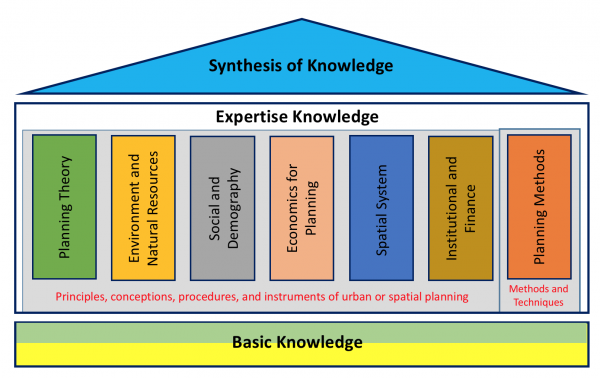The 2013 curriculum of the UPURP is designed for 8 semesters and is divided into two study stages:
Stage-1 :
- Common First Year Program (TPB): 2 semesters, 36 CU
- All students within the SAPPD take the same courses
Stage-2 :
- Bachelor Program: 6 semesters, 108 CU
- Compulsory Courses: 83 CU
- Elective Courses: 15 CU (Internal: 12 CU; External: 3 CU)
- Free Courses: 10 CU
The program structure in stage-2 is designed to offer students the flexibility to take the course in their expertise of interest. Students can even choose areas of study by combining subjects from different departments and/or faculties that tailor to the students’ goals from the elective courses.

Basic Knowledge
In this first year, students are introduced to about 13 basic knowledge in ITB, illustrated as the yellow stripe, which are: Mathematics 1A & 2A, Elementary Physics 1B & 2B, and Basic Chemistry 1B & 2B. As the foundation, the students are started to be given a good basic concept of natural science and technology to acquire scientific thought towards planning and design before going deeper on a specific major. The degree of difficulty (A or B) depends on the requirements of a particular major, in which for Urban and Regional Planning major need A level of mathematics concepts and B level for physics and chemistry. In addition, there are also other courses which are coordinated by ITB, Introduction to Design and Engineering I & II, and also Introduction to Information Technology B whose total credit unit is 12. Subsequently, School of Architecture, Planning and Policy Development (SAPPD) course cluster is introduced to the students in the first year through a course, named Fundamentals of Planning and Design and Communication and Presentation Techniques in the two first semesters respectively. Meanwhile, with regards to the development of interpersonal capability, there are 3 supporting courses with a total of 6 credit unit which is given to the students, such as Sports, English, and Scientific Paper Writing in Indonesian.
Expertise Knowledge
The dominating direction of the field of study is started to change according to the Undergraduate Program in Regional and Urban Planning (UPRUP) objectives. Urban and Regional Planning students are required to understand spatial and non-spatial basic elements and principles of urban and regional planning. Therefore, the courses that are given to the students would be dominant in introducing the important elements of urban and regional planning, such as Environmental Geology, Economics, Land Use, Population, Infrastructures, Spatial system, etc. Each of those courses is the instruments to improve skills in the planning process, in order to apply the prevailing procedures, regulations, and instruments for implementation of concepts in urban planning and design, regional and rural planning, and infrastructure planning. Moreover, they would be required to learn about substantive and procedural theories of planning, such as Urban Planning, Infrastructure Planning, Land Use Planning, Social System and Community Development, Rural Planning, etc. The students will get planning core courses, which consist of the types and approaches of urban and regional planning. The major planning courses that will be given are Site Planning, Urban Planning, Rural Planning, and Regional Planning. There are also methods and techniques of planning courses which will be given to the students such as Introduction to Spatial Data, Planning Methods, Planning Evaluation Techniques, Planning Information System, and so forth.
Synthesis of Knowledge
The students are further encouraged to apply their knowledge which was received from the other courses in series of practice-oriented student projects and design studio. The students required to integrate the process of urban and regional planning and design based on a real condition according to the needs and constraints, using rational, participatory, comprehensive, innovative and creative approaches. Practice-oriented student project and design studio in UPRUP ITB include Site Planning Studio for Residential, Urban and Regional Infrastructure Studio, Urban Design, Urban Planning Studio, and Regional Planning Studio. In conjunction with that, these courses also improve the student’s skills to integrate coded planning practice in making sound judgment and good sense with colleagues and other stakeholders in the professional work environment. In addition, the student will be encouraged to apply their knowledge in the practice field, which is accommodated in the Internship course. Besides supporting student’s personality and work ethic, this course can also support in understanding the connection of theories and practices. During two months internship programme, the student is given the opportunity to experience first-hand on how to work in planning field while also implementing their knowledge. Moreover, in terms of preparing the student’s Final Project, they will be given Research Method course which supports the development of research proposal. It can be told that the students begin to take desired courses based on the developing topics that can support their research’s interest/thesis



